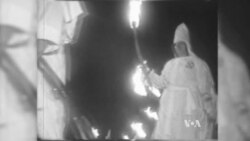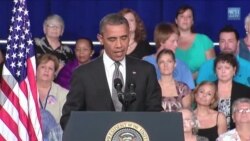In the 21st century, extreme bigotry – once expressed openly at events like Ku Klux Klan rallies – can often go unseen.
“We moved from a very overt kind of racism to covert racism, which is dangerous and insidious because it’s harder to call it out, and it’s harder to acknowledge it, and it’s easier not to acknowledge it," said University of Maryland sociologist Kris Marsh.
The Internet offers those with extremist views a largely unmoderated place to vent their hate. On websites and social media, people rail anonymously against blacks, Asians, Hispanics, the government, Jews, and more.
But sometimes that hatred goes beyond angry text on a screen, occasionally with tragic consequences. Dylann Roof, the man who police say gunned down nine black parishioners in a Charleston, South Carolina church last month allegedly posted a racist manifesto online. In it, he describes reading about “black on white crime” on the website of a white supremacist group.
“I have never been the same since that day,” Roof wrote.
Experts say the web helps extremists find others who share their views, and that can reinforce and even motivate them.
“There are very few things that are more powerful than having people tell you they agree with what you believe or your worldview,” said J.M Berger, a fellow at the Brookings Institution who has written extensively on extremists and their use of social media.
But even those who subscribe to those radical views may not know when someone is likely to go from online ranting to real life violence.
“I’ve seen members of supremacist groups say, for example, 'we can’t just tell one nut who is ranting and raging on the internet from one nut who will pick up a gun the next day and go and kill someone',” said former FBI profiler Clint van Zandt.
Changing the conversation
Elyssa Morris, who grew up in a multicultural environment, said one solution is to get people to leave those online spaces where everyone shares a similar point of view.
“If they stopped sitting behind their screens and started talking and got out there and were really open to seeing the world, maybe they would have different views,” she said.
Cornell Brooks, the president of the NAACP, the nation’s largest and oldest civil rights organization, said racism must also be fought at institutional levels of U.S. society
“It’s not enough for us to talk at a kind of grand theory level. We have to get down to a level of battles,” he said. “How to address bias or bigotry in the school system. What specific ways can we address that? What specific ways can we address employment challenges?”
In his eulogy for one of those slain in the June 17 massacre at the Charleston church, President Barack Obama said that race relations will not improve “overnight” no matter what solutions are discussed and proposed.
“People of goodwill will continue to debate the merits of various policies, as our democracy requires -- this is a big, raucous place, America is,” he said. “And there are good people on both sides of these debates. Whatever solutions we find will necessarily be incomplete.”






